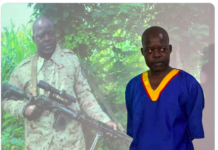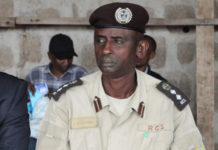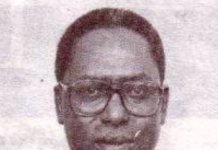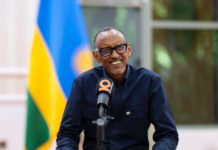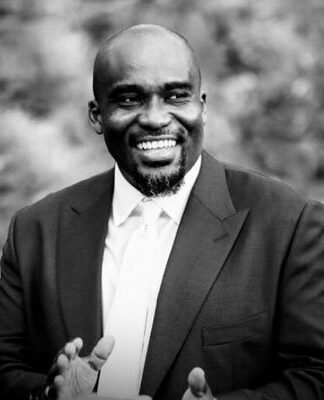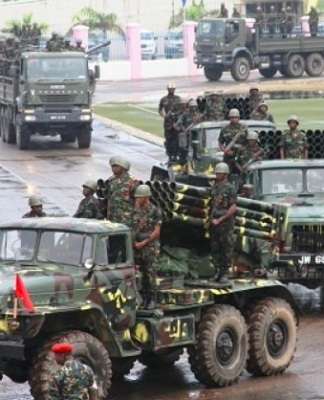Sanction Rwandan Officials Backing Abusive Congolese Rebels
(Washington) – The United States government should publicly support sanctions against Rwandan officials backing the armed group M23, which has been responsible for widespread war crimes in eastern Democratic Republic of Congo. M23 rebels, whose commanders have been implicated in serious abuses, captured the city of Goma on November 20, 2012.
“The US government’s silence on Rwandan military support to the M23 rebels can no longer be justified given the overwhelming evidence of Rwanda’s role and the imminent threat to civilians around Goma,” said Tom Malinowski, Washington director at Human Rights Watch. “The US government should support urgent sanctions against Rwandan officials who are backing M23 fighters responsible for serious abuses.”
Rwandan military support for the M23 rebels has been evident in their offensive that began on November 15, Human Rights Watch said. Several civilians living near the Rwandan border told Human Rights Watch that they saw hundreds of Rwandan army soldiers crossing the border from Rwanda into Congo at Njerima hill, Kasizi, and Kabuhanga in apparent support of M23 fighters. Human Rights Watch has also documented several incidents in which Rwandan and Congolese soldiers fired across the border from either side between November 16 and 20.
A draft of the final report of the United Nations Group of Experts on the Democratic Republic of Congo, soon to be published, alleges that the Rwandan government has provided “direct military support to M23 rebels” and that the “M23’s de facto chain of command includes General Bosco Ntaganda and culminates with the Rwandan Minister of Defense General James Kabarebe.” Ntaganda is on the UN sanctions list and is sought on arrest warrants from the International Criminal Court for war crimes and crimes against humanity.
Human Rights Watch has independently established that the Rwandan army has regularlyprovided significant military support to the M23, including overseeing operational planning, providing weapons and ammunition, recruiting at least 600 people in Rwanda to fight for the M23, training new recruits, and deploying Rwandan army troops to eastern Congo in direct support of M23 rebels.
Over the past seven months, Human Rights Watch has documented widespread war crimes by M23 rebels in eastern Congo, including summary executions, rapes, and forced recruitment, including of children. Rwandan officials may be complicit in war crimes through their military assistance to M23 forces throughout this period, Human Rights Watch said.
The draft UN Group of Experts’ report says that, “Rwandan officials coordinated the creation of the rebel movement as well as its major military operations” and “provided military support to M23 through permanent troop reinforcement and clandestine support by RDF [Rwandan Defence Forces] special units.” The Group of Experts found that “RDF commanders operated alongside M23 and provided logistical support during the July 2012 operations which enabled the capture of Bunagana, Rutshuru, Kiwanja and Rumangabo.” During these operations, “the rebels killed one [UN] peacekeeper at Bunagana and fired on the [UN peacekeeping] base at Kiwanja,” the report states.
The Group of Experts also documented support to the M23 by commanders of the Ugandan People’s Defence Force. While stating that “Rwandan officials exercise overall command and strategic planning for M23,” they note that “senior Government of Uganda officials have also provided support to M23 in the form of direct troop reinforcement in DRC territory, weapons deliveries, [and] technical assistance.”
“The fall of Goma to the M23 magnifies the security risks to civilians in eastern Congo,” Malinowski said. “As a permanent member of the UN Security Council, the US should press for sanctions that target not only the M23 but the foreign officials backing their atrocities.”
The Group of Experts has recommended individual sanctions against several Rwandan and Ugandan officials named in its report.
The M23’s latest offensive began on November 15 with M23 rebels fighting UN peacekeepers and Congolese army forces as the rebels progressed toward Goma. By the early afternoon of November 20, after heavy fighting in and around Goma, the M23 had taken control of key areas of Goma. Congolese army soldiers had fled the town, while UN peacekeepers were still present.
Human Rights Watch has received reports of at least 11 civilians killed and dozens of others wounded during the fighting in and around Goma since November 15. An estimated 80,000 people are newly displaced in the area around Goma, including an estimated 60,000 who were in a displacement camp about 10 kilometers outside Goma, according to the UN Office for Humanitarian Affairs.
“The US should endorse all measures that would enable UN sanctions against Rwandan officials who are assisting the M23,” Malinowski said. “All parties to the conflict should take urgent measures to protect civilians and stop abuses.”
Background on the M23
The M23 is largely made up of soldiers who took part in a mutiny from the Congolese army between late March and May 2012. Many were previously members of the National Congress for the Defense of the People (CNDP), a former Rwanda-backed rebel group that integrated into the Congolese army in January 2009. Bosco Ntaganda, who was then a general in the Congolese army, initially led the mutiny. In May, Col. Sultani Makenga, a former colleague of Ntaganda in the CNDP, announced he was beginning a separate mutiny. In the days that followed, Ntaganda and his forces joined Makenga. The new armed group called itself the M23. The M23 claimed the mutiny was to protest the Congolese government’s failure to fully implement the March 23, 2009 peace agreement (hence the name M23), which had integrated them into the Congolese army.
Some of the M23’s senior commanders have well-known histories of serious abuses, committed over the past decade in eastern Congo as they moved from one armed group to another. They have been responsible for ethnic massacres, recruitment of children, mass rape, killings, abductions, and torture. Before the mutinies, at least five of the M23 leaders were on a UN black list of people with whom the UN would not collaborate due to their human rights records.
Ntaganda has been wanted by the International Criminal Court since 2006 for recruiting and using child soldiers in Ituri district in northeastern Congo in 2002 and 2003. In July, the court issued a second warrant against him for war crimes and crimes against humanity, namely murder, persecution based on ethnic grounds, rape, sexual slavery, and pillaging, also in connection with his activities in Ituri.
Human Rights Watch has documented numerous war crimes and crimes against humanity by troops under Ntaganda’s command, as well as by other M23 commanders, including Col. Makenga, Col. Innocent Zimurinda, Col. Baudouin Ngaruye, and Col. Innocent Kayna.
On November 12, 2012, the UN Security Council added Makenga to its list of individuals under sanctions, including an asset freeze and a travel ban. On November 13, the US imposed sanctions on Makenga, which includes an asset freeze and forbids American citizens from undertaking any transactions with him.










